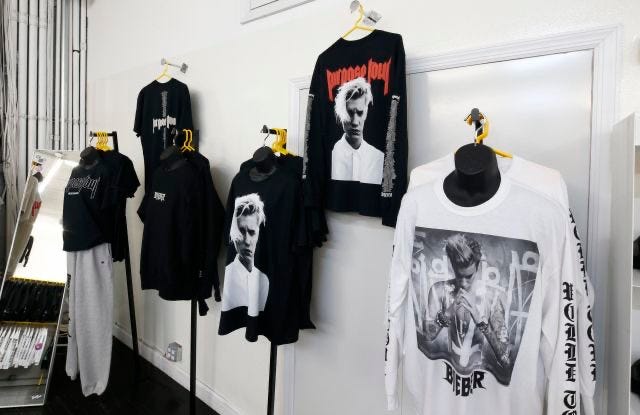The Fashion Merch Machine
From artists and musicians to influencers and creators, why is everyone releasing merch?
Hot Takes is a place where I explore and analyse what's going on in the realm of fashion in a relatable way, basically my bullet point thoughts on fashion's hottest issues. These posts get to the heart of why people are talking about what they’re talking about, what this means and where this could go next.
Think: what direction is fashion heading in? What’s new, innovative and exciting? What's going on in fashion that's really pissing people off?
Hot Takes ties fashion topics to a wider cultural and social context, and digs into why these topics are important and the often more significant meanings behind them. I hope they give you a little more food for thought.
So sit back, relax and let's get into it. Here’s Hot Takes #7.

Once upon a time, merch was limited to artists, bands and promoters making official merch that spanned everything from t-shirts, hoodies and sweats to badges, buttons and DIY-inspired zines. But in today's world, the merch machine looks a little different. Fast forward a few decades and artists are taking a strategic approach to merch, with Justin Bieber releasing his Purpose Tour merchandise designed by Fear Of God founder Jerry Lorenzo readily available to buy in pop-up shops and retailers such as Barneys and Urban Outfitters, and Zayn Malik inviting renowned illustrator Mark Wilkinson, famous for his work with classic British brands, to design vintage inspired t-shirts available to purchase online.
The average artist made over $10,000 per show in gross merchandise sales in 2022, while the typical Spotify artist only made around $625 in royalties over a year - it's easy to see the cash incentive behind artists releasing merch. But artists and musicians better buckle up as another category of creators is coming for a slice of the merch pie. You guessed it, influencers are starting to dominate the merch sector. While merch sales may only count for a fraction of an influencer's overall earnings, creator Matt Meagher sold over $40,000 worth of merch in a single day. Fashion merch is now big business.
Exclusivity x scarcity
Early merch aficionados used to travel the world to get the latest merch releases. Because the original purpose of merch wasn’t just to have something trendy to wear on your back, it was a way to show you were in a certain place at a certain time and you had the merch receipt to prove it. These limited edition pieces of memorabilia have turned into a multibillion-dollar business as the appeal relies heavily on exclusivity, hype and scarcity - if everyone has it no one wants it, and if it's only available in select quantities it drives the demand up. No one wants merch fomo, so snap it up before it's gone.
An identity extension
Our outfits speak a thousand words without us having to say a damn thing, and you can tell a lot about a person by the type of merch they wear as you have an insight into the type of music they listen to and the artists they like. It’s like an age-old version of Spotify wrapped that’s signposted on a t-shirt. And this identity extension has been brought into the 21st century through influencer merch that allows people to personally buy into a brand of creators they support through the form of merch and apparel. It’s another way to show a little love to those they admire while elevating an influencer's personal branding.
Culture x commerce
Although initially founded as an alternative to mainstream stereotypes and aesthetics, merch has moved away from its culture-driven roots and has become a commerce beast. And with that, the world of merch has become over-saturated as it profits off of loyal fandoms, which is, you know, the exact opposite of its original intentions. Brands, businesses and creators are pumping out merch release after merch release, and a once affordable way to signpost fan loyalty has turned into a capitalist metric. But some companies, such as Merchbar, are trying to right the merch wrongs and offer a more personal artist-led approach to merch.
My two cents.
In today's digitally driven and perfectly curated aesthetic era turning merch into meaningful clothes isn’t as simple as it once was, but that's not going to stop anyone and everyone from trying their hand at merch. High fashion approaches to merch-inspired clothing have been explored by brands such as Vetements, Louis Vuitton, Acne Studios and Supreme, with the likes of Kendall and Kylie Jenner receiving backlash after they released a line of t-shirts with Biggies and Tupacs faces on, prompting Biggie’s mother to release an official statement about the collection (no surprises from this duo tbh).
As the merch machine pivots into influencer territory, it can teach us a lot about the modern-day value of creating community and connecting with people that speak a common language. Love them or hate them, influencers' follower counts can pack a punch and savvy creators are wising up to this by doubling down on using merch designs and messaging that speaks directly to their audience. While a brand, a musician and an influencer's end goals may differ if one thing is for certain it's that merch is now an even more fashionable way to maintain relationships and earn a few bucks in the process.
What do you think of these kick-starter thoughts that I hope will encourage you to think a little more deeply about this topic? Let me know in the comments, I want to chat about it.



